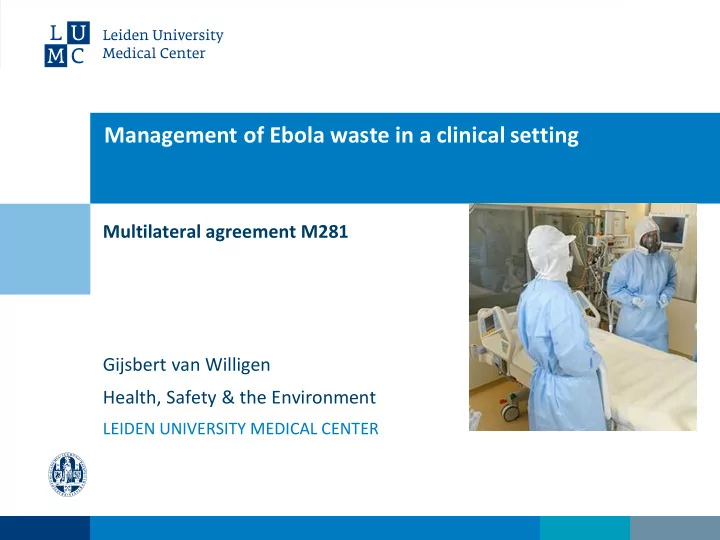

Management of Ebola waste in a clinical setting Multilateral agreement M281 Gijsbert van Willigen Health, Safety & the Environment LEIDEN UNIVERSITY MEDICAL CENTER
Marburg patient LUMC 2008 • Woman of 41 years old • Round trip through Uganda: • Visited: • Bat caves • Gorillas • Pygmies • Swimming in fresh water • Several insect bytes • Hospitalization on July 5th. • Reason for hospitalization: fever • Lab-tests: malaria, typhoid fever and other tropical diseases. All results were negative 2 Management of Ebola waste 5-Nov-15
Marburg patient LUMC 2008 • July 7 th : Transfer of the patient to the LUMC for liver transplant • Low suspicion for a viral hemorrhagic fever • Patient was isolated and nursed according to the protocol of very contagious disease • July 9 th : • Suspicion became high for Ebola or Marburg • Testing for Ebola and Marburg is send in to Rotterdam (ErasmusMC, the Netherlands) and Hamburg (Bernhard Nocht Institute, Germany) • July 10 th : • Patient died early in the morning • Positive diagnoses for Marburg late in the morning 3 Management of Ebola waste 5-Nov-15
Protocol for very contagious diseases • Hospital staff nursing and treating the patient had to wear PPE’s: • Coverall, respiratory protection, goggles, double gloves, apron etc. • All waste was collected in autoclavable medical waste containers: • Used PPE’s • Bed linen • Secreta and excreta of the patient • Everything that entered the isolation room was discarded as waste • After the patient died the room prepped for VHP-decontamination: • Only equipment and the bed stayed in the room • Everything else was discarded as waste, incl.: • matrass, curtains • unused disposables etc. etc. 4 Management of Ebola waste 5-Nov-15
An “empty” room 5 Management of Ebola waste 5-Nov-15
Waste management • Waste was collected in medical waste bins UN3291 with sterilid: • Laboratory waste • Waste from the isolation room • Collected waste was stored in a secured location pending for further processing • No waste bins for collection of UN2814 waste available 6 Management of Ebola waste 5-Nov-15
Waste management • Amounts of collected waste: • Laboratories: • 12 containers (6 of 30 liter and 6 of 50 liter) • Isolation room: • 72 containers of 50 liter • Total amount of waste collected in 72 hours: • 3500 liter or 1000 kg • Normally 450 medical waste containers of 50 liters in 72 hours for the entire Leiden University Medical Center (~450 patients) 7 Management of Ebola waste 5-Nov-15
Waste management • Medical waste bins comply to P621 and not to P620: • No transport of the waste allowed to the incinerator • Inactivation should take place within the medical center • Inactivation of the waste: • 4 destruction autoclaves • 2 bins per autoclave run • 2 operators • 4 days • 10 hours a day 8 Management of Ebola waste 5-Nov-15
Waste management Available autoclave capacity in the Netherlands: • Leiden University Medical Center • Amsterdam Medical Center • Erasmus Medical Center • Other medical centers no or insufficient capacity • In Belgium no capacity available 9 Management of Ebola waste 5-Nov-15
Waste containers for UN2814/P620 VE Systems Alex Breuer (DE) Carepack (NL) Mauser 10 Management of Ebola waste 5-Nov-15
Waste containers for UN2814/P620 Advantage: • Transport of non treated UN2814 waste is possible • No in-house destruction needed Disadvantages: • Bins are not a daily routine for the nursing staff • Increased risk: • Small filler neck of the bins • Small volume and allowed weight (around 7 kilo’s) • Sharp edges • Not easily purchased, small stock at supplier • Expensive 11 Management of Ebola waste 5-Nov-15
Multilateral agreement M281 • Meeting from delegations from Belgium and the Netherlands: • Biosafety experts • Experts infection prevention • Competent authorities (Transport, Public Health) • Waste transporters • Incineration plant (Zavin, NL; Indaver, BE) • Goal: find an alternative method for Ebola waste management • Alternative should be safe (collection, transport and incineration) • Approval from all parties • Initiate the process for a multi-lateral agreement at UNECE (UN Economic Commission Europe ; ADR) 12 Management of Ebola waste 5-Nov-15
Multilateral agreement M281 Prerequisite: method should be safe • Collection: • Preferably the UN3291 should be used • Transport: • Packaging for transport to the incinerator should offer similar safety as existing UN2814 / P620 packaging • Incineration plant: • The waste must be processed in the normal operation of the incinerator 13 Management of Ebola waste 5-Nov-15
Multilateral agreement M281 14 Management of Ebola waste 5-Nov-15
Multilateral agreement M281 The solution, a combination packaging consisting of: • Primary packaging: P621 waste container or 1H2 barrel • Closed and leak proof • Secondary packaging: plastic bag minimal 75um • Closed and leak proof • Contains absorption material • Tertiary packaging: 1H2 barrel or 4H2 box • Closed and leak proof • Should fit the feeding opening of the incinerator 15 Management of Ebola waste 5-Nov-15
Multilateral agreement M281 Sluit het 120 L vat * met het bijhorende deksel. Primary packaging Zet het deksel vast met de ringsluiting. 1H2 barrel P621/UN3291 Secondary & tertiary packaging 16 Management of Ebola waste 5-Nov-15
Multilateral agreement M281 COUNTRY SIGNED REVOKED Belgium 14/11/2014 Germany 27/11/2014 Netherlands 4/12/2014 Switzerland 8/12/2014 Luxembourg 12/12/2014 Austria 3/08/2015 17 Management of Ebola waste 5-Nov-15
Multilateral agreement M281 Experience in the Netherlands: • 1 positive Ebola patient • All parties involved were positive on the procedure described in M281 18 Management of Ebola waste 5-Nov-15
Multilateral agreement M281 Unfortunately M281 expires January 1, 2017 Should we: • Prolong M281 after January 1, 2017, if possible • Embed the procedure in ADR 19 Management of Ebola waste 5-Nov-15
20 Management of Ebola waste 5-Nov-15
Recommend
More recommend